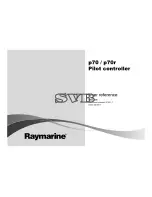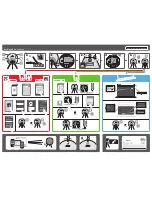
5-1
5
AED
5.1
Overview
This chapter describes how to operate the equipment in AED Mode. While operating in AED Mode, the equipment
analyses the patient’s ECG waveforms and guides you through the defibrillation process.
The equipment starts analyzing the patient’s heart rhythm immediately after entering AED mode. When a shockable
rhythm is detected, the equipment gives a prompt and automatically starts charging. If a shockable rhythm is not
detected, a “No shock advised” prompt is given. Smart defibrillation analysis goes through automated external
defibrillation until the equipment enters CPR or abnormal pads connection occurs.
While operating in AED Mode, the capabilities of the device are limited to those essential to the performance of
automated external defibrillation. Only ECG signals acquired through pads are displayed.
5.2
Safety
DANGER
Defibrillation current can cause operator or bystander severe injury or even death. Never touch the
patient or any equipment connected to the patient (including the bed or gurney) during defibrillation.
Avoid contact between parts of the patient’s body such as exposed skin of head or limbs, conductive fluids
such as gel, blood, or saline, and metal objects such as a bed frame or a stretcher which may provide
unwanted pathways for the defibrillating current.
Do not allow multifunction electrode pads to touch each other or to touch other ECG monitoring
electrodes, lead wires, dressings, etc. Contact with metal objects may cause electrical arcing and patient
skin burns during defibrillation and may divert current away from the heart.
To avoid explosion hazard, do not use the equipment in the presence of oxygen-rich atmospheres,
flammable anesthetics, or other flammable agents (such as gasoline). Keep the equipment and the
operating environment dry and clean.
WARNING
During defibrillation, air pockets between the skin and multifunction electrode pads can cause patient
skin burns. To help prevent air pockets, make sure defibrillation pads are completely adhered to the skin.
Do not charge and deliver shocks frequently for a long time if disposable battery is used.
Do not use dried-out pads.
Summary of Contents for BeneHeart D1
Page 1: ...BeneHeart D1 Automated External Defibrillator Operator s Manual...
Page 2: ......
Page 8: ...VI FOR YOUR NOTES...
Page 42: ...6 6 FOR YOUR NOTES...
Page 50: ...7 8 FOR YOUR NOTES...
Page 58: ...9 6 FOR YOUR NOTES...
Page 86: ...B 4 FOR YOUR NOTES...
Page 88: ...C 2 FOR YOUR NOTES...
Page 92: ...D 4 FOR YOUR NOTES...
Page 96: ...E 4 FOR YOUR NOTES...
Page 100: ...F 4 FOR YOUR NOTES...
Page 102: ...G 2 FOR YOUR NOTES...
Page 104: ......
Page 105: ......
Page 106: ...P N 046 004673 00 3 0...
















































